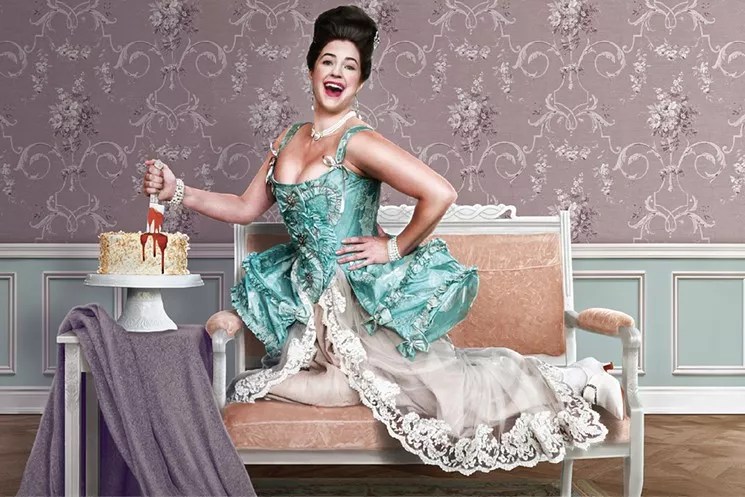
Michael Ensminger

Audio By Carbonatix
It’s been a fascinating time in Denver theater, a time of ferment, renewal, excitement, hope and loss. And through it all, the community has continued to produce first-rate art. Here are some of the noteworthy trends in 2017, as well as my picks for the best theatrical achievements of the year.
On many levels, 2017 was the year of the woman. Kent Thompson, the artistic director ousted from the Denver Center for the Performing Arts early this year, had set up a Women’s Voices Fund dedicated to supporting new work by female playwrights and always made sure that plays by women were part of the Denver Center’s lineup. But in 2017, feminism moved to the fore all around town.
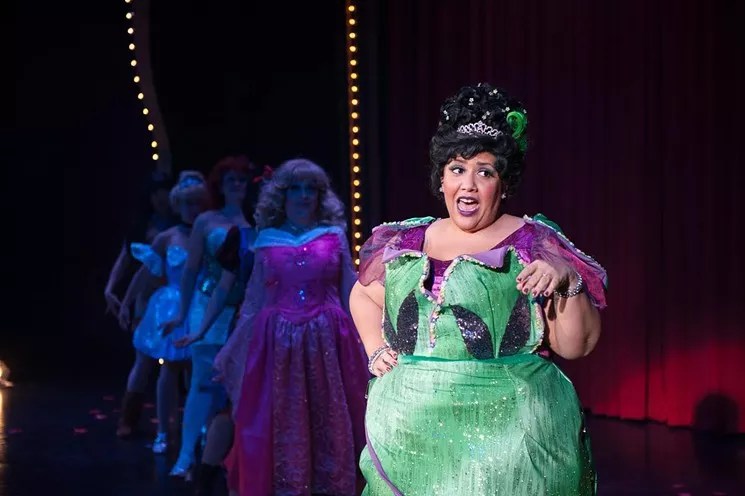
Anna High as the Princess Who Kissed the Frog in Disenchanted.
Glenn Ross Photography
The Drowning Girls, in which the women murdered in the bath by England’s infamous George Joseph Smith come to life to reveal the limitations and difficulties faced by women in the early twentieth century, was beautifully rendered at the Arvada Center. On a much lighter and more musical note, BDT Stage came up with Disenchanted, with fairytale heroines revealing the not-so-romantic truths behind their iconic stories. Much closer to the bone was House of Gold by Square Product Theatre, which centered on the sadly truncated life of murdered child JonBenet Ramsey and featured imagery suggesting that maleness in itself is violent and toxic – not something we agree with, but worth thinking about. LOCAL Theater Company’s The Rape of the Sabine Women, by Grace B. Matthias, a play about the rape of a teenage girl by football players, touched on some of the same themes, though it’s a more complex and ambitious script.
Finally we saw Lauren Gunderson’s The Revolutionists, staged by Boulder Ensemble Theatre Company. The play explores France’s reign of terror through the lives of four women, three of them drawn from real life and the fourth semi-fictional. The script is funny and also filled with pathos – even horror – and the structure is wittily experimental. The entire crew for this show was female, from the director through the designers for set, lighting and costumes.
Best Feminist Production: The Revolutionists.
Best Portrayal of a Silly, Vain and Vulnerable Woman: Adrian Egolf’s unforgettable Marie Antoinette in The Revolutionists.
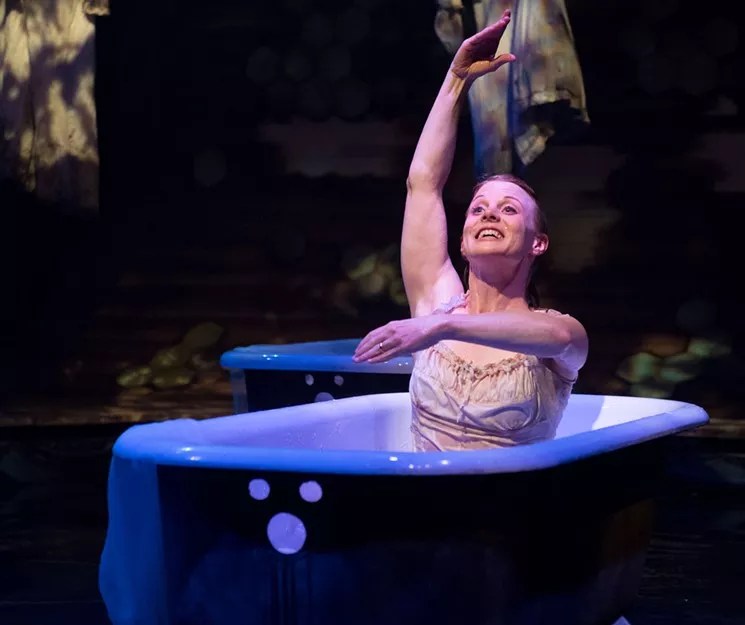
Jessica Robblee in The Drowning Girls.
Matthew Gale Photography
Best Set Design: Brian Mallgrave, who created the ghostly, evocative and water-soaked set for The Drowning Girls at the Arvada Center.
Politics in general was a major theme in 2017, and Curious Theatre Company re-dedicated itself to the pursuit of social justice. In April the company offered its response to Donald Trump: Building the Wall by Robert Schenkkan, author of All the Way, a critically acclaimed play about Lyndon B. Johnson. Schenkkan was so appalled by the election, including the run-up to it, that he rapidly penned this passionate, angry two-hander about how a regular American kid who’s put in charge of hundreds of imprisoned immigrants eventually cracks and commits atrocities. Curious artistic director Chip Walton raced to find space in his schedule for Building the Wall, and though both script and production were somewhat raw, the effect was profound.
Curious also mounted Appropriate, a play by Branden Jacob Jenkins that explores African-American issues with an entirely white cast, an Arkansas family returning to the patriarch’s home after his death to sort out his belongings, who discover a cache of lynching photographs. These folks are pretty soul-sick to begin with, and their reaction to the terrible images is stomach-turning. Through this oddly sideways approach, and the sheer ugliness it depicts, Appropriate brings the unmitigated horror of slavery thudding home.
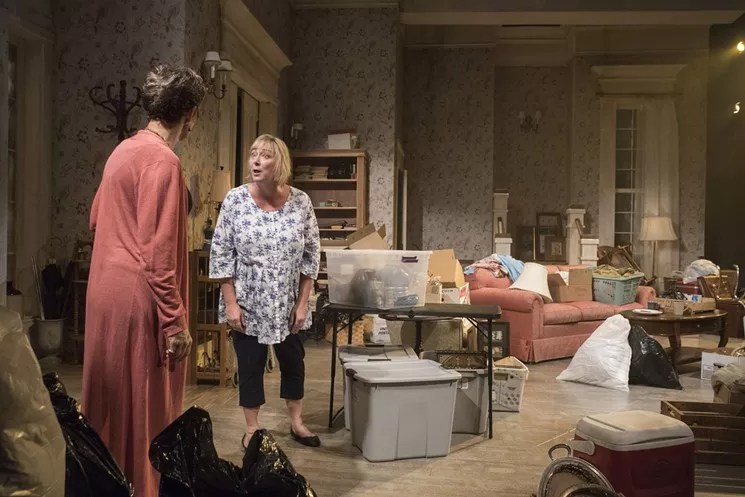
Dee Covington in Appropriate.
Curious Theatre Company
Best Political Theater: Curious Theatre Company.
Best Exploration of Race: Appropriate, helmed by Jamil Jude in a topnotch production.
Another 2017 trend we appreciated was the number of theaters daring to stage plays that are out-and-out nasty. We like watching nasty now and then; it’s like the tinge of bitter that enhances rich, sweet chocolate. There were Bad Jews at the Edge Theater Company (even the title is controversial); The Luckiest People at Curious, in which a carping, querulous, angry old man holds his family hostage to his whims; Smart People, a sharp-tongued discussion of race at the Denver Center; Edward Albee’s lacerating A Delicate Balance at Edge; and, also at Edge, Moira Buffini’s savage Dinner. The dialogue is brilliant: corrosive on the surface and with all kinds of semi-submerged significance underneath.
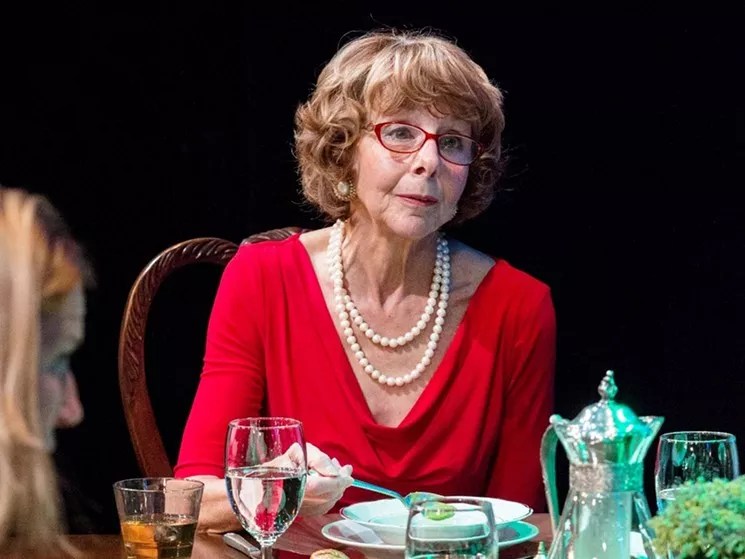
Carol Bloom as Paige in Dinner.
RDG Photogrphy
Best Nasty Script: Dinner, by Moira Buffini
Best Portrayal of a Complex, Cranky Patriarch: Randy Moore in The Luckiest People.
Best Portrayal of Crazy: Missy Moore as Daphna, one of those irritating, more-Jewish-than-thou people who uses her religion as a battering ram, in Bad Jews.
Best Trio of Actresses: We’d go almost anywhere to see Emma Messenger, Maggy Stacy or Martha Harmon Pardee onstage, and Edge’s A Delicate Balance let us savor the unique pleasure of watching all three women working together. In our review we mentioned Pardee’s “pained hostess’s smile freezing on her face,” Messenger’s “intense dark humor” and Stacy, whose Julia was “a whirlwind, a volcanic eruption.” These forces worked with and against each other to help create one of the most exciting productions of the year.
Some people and plays didn’t fit any theme, but deserve to be honored for breaking the mold.
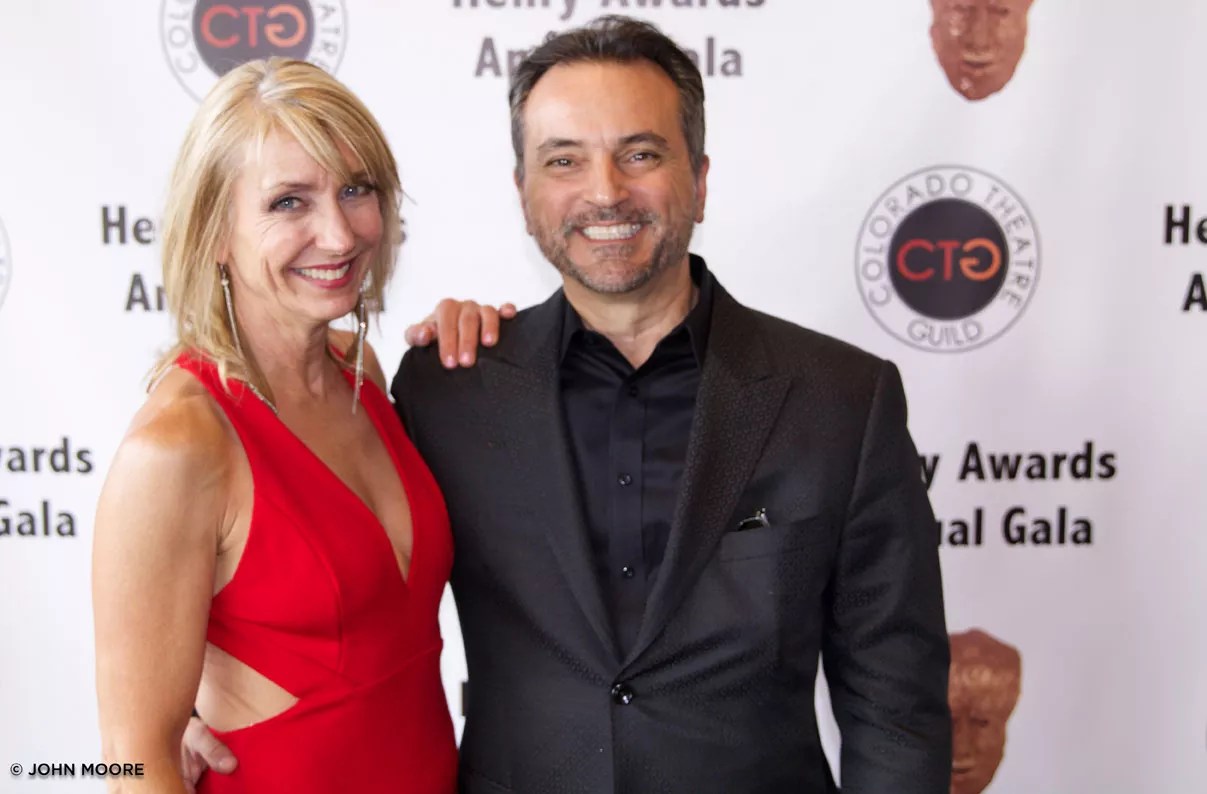
Edge Theater
John Moore
Best Departing Company: After all the area productions we’ve seen, it’s hard to get excited about David Mamet’s Glengarry Glen Ross or Arthur Miller’s Death of a Salesman, but those are what Edge – one of the most energetic and interesting small companies around – has chosen for the last two official shows in its current space in Lakewood. After that, the company will leave the home it’s occupied for seven years so that Edge founders Rick and Patty Yaconis can contemplate their future direction. No matter the quality of the company or the devotion of its audiences, the sad truth is that it’s almost impossible to make a living doing theater around here, and the Yaconises have never taken salaries for themselves. If these two final plays seem surprising, they both focus on the hard exigencies of selling, and we’re expecting a couple of well-executed evenings of theater this spring. In the meantime, the Yaconises deserve to be honored for their energy, dedication and ingenuity.
Best New Company: It takes a lot of guts to start a new theater company in this time of rising rents and diminishing resources, and Haley Johnson (producing artistic director) and Rachel Rogers (executive artistic director) displayed plenty when they created Benchmark, plunging into the theatrical maelstrom with brio. The company’s mission is “to stimulate conversations about the universal human experience and nourish the imaginative spirit of our community through thought-provoking productions,” and a couple of shows at Buntport last year definitely fit that description. Benchmark will be moving into the space currently occupied by Edge later in 2018.
Best Performance by a City: Longtime executive producer Charles Packard recently left the Aurora Fox, and the City of Aurora just hired a replacement, Helen R. Murray. An actor, playwright, director and co-founder of the Hub Theatre in Virginia, Murray has a stellar resume and should bring a breath of fresh air to this somewhat undefinied venue. While Murray, who arrives in January, won’t really take over until summer, a handful of fascinating productions are already planned for spring: Real Women Have Curves, in which a young Latina factory worker dreams of becoming a writer; the innovative musical Passing Strange; and Hedwig and the Angry Inch, to be directed by Nick Sugar, who was a sensation as Hedwig a few years back at the Avenue. Congratulations to Aurora for an ambitious hire, and to patron services manager Beau Bisson for keeping the flag flying in style during the transition.

Timothy McCracken and Sam Gregory in Waiting for Godot.
M. Gale Photography
Best Director: Geoffrey Kent directed Waiting for Godot at the Arvada Center in the spring, followed by The Foreigner in fall, and his talent for comic schtick – evident in both productions though very differently employed in each – is peerless. He’s also a fanatic about meaning and text, and his feeling for language and rhythm pulsed through those famous pauses in Godot.
Best Acting in a Tragi-Comedy: Sam Gregory, for his sadly funny Vladimir in Godot.
Best Theater Blow-Out: The music was playing loud and crazy as we left The Wild Party; audience members wearing beads, feathers and flapper dresses were swaying along the aisles fueled by shots of gin; and this critic found herself dancing wildly with a handsome, laughing Arab man she’d never seen before. How many productions can produce an effect like that? The Wild Party -which obviously lived up to its name as an immersive evening for the Denver Center’s Off-Center – was directed by Amanda Berg Wilson, artistic director of the Catamounts, who managed to assemble an exciting cast of singers and stitch together the discrete scenes to provide continuity and narrative, all in the Hangar at Stanley Marketplace, a large space featuring all kinds of pillars, nooks and cubbies, and crammed with ’20s furniture. The script is supposed to be dissolute and depraved, but The Wild Party just felt like huge fun.
Best Small, Finely Textured Play: Birds of North America, a world premiere by the Boulder Ensemble Theatre Company, was written by Anna Moench, who won the company’s annual playwriting competition. Though there are sorrows and sparks of rage in this play about a father and daughter who understand each other all too well and also not at all, the overall effect is gentle, and the acting of Chris Kendall and Lindsey Pierce brimmed with feeling. Stephen Weitz’s subtle direction, Tina Anderson’s set and Katie Gruenhaen’s lighting all combined for an exquisite evening.
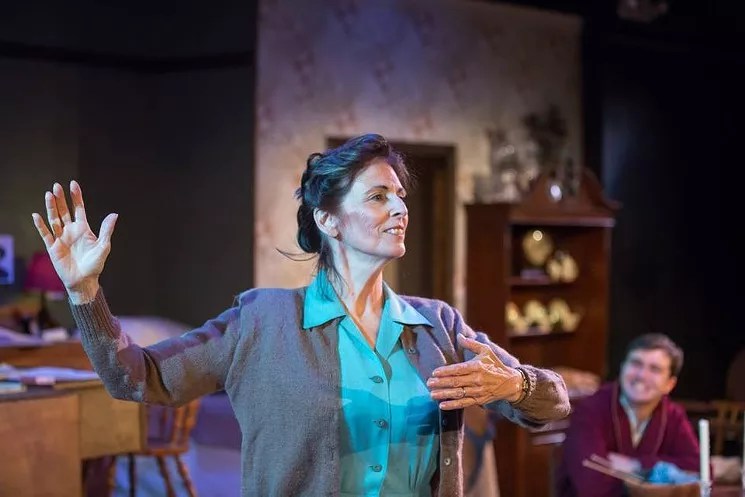
Cindy Laudadio-Hill as Kate in Broadway Bound.
Miners Alley
Best Subtle, Layered Performance: Cindy Laudadio-Hill gave one of the finest performances of the year as Kate in Broadway Bound at Miners Alley. Playwright Neil Simon made Kate, a woman devoted to caring for her family, the central figure in this story of time passing and a home slowly crumbling, and Laudadio-Hill embodied the role with exquisite grace.
Best Indelible Performance: Bill Hahn in Burn This. Almost a year later after the Edge production, we can still see Bill Hahn’s leaping form and flayed features in Burn This. His character, Pale, is insanely coked-up, jerky and at the same time perversely graceful, as he expounds on the problems of New York City (“dying of crotch rot) and complains about the way his expensive lizard shoes make his feet burn.
Best Actor We Lost: The theater community is still mourning the loss of Daniel Langhoff, who died of cancer in November. The onstage presence of this talented performer, with his splendid singing voice and fine acting chops, always provided pleasure. In Next to Normal at Littleton Town Hall, Langhoff gave his all in a moving performance as weary, loving, sometimes obtuse Dan, and in Ragtime, he made Younger Brother fiery and passionate rather than deluded. He was also purely hilarious in the silly, funny Five Course Love at the Garner Galleria.